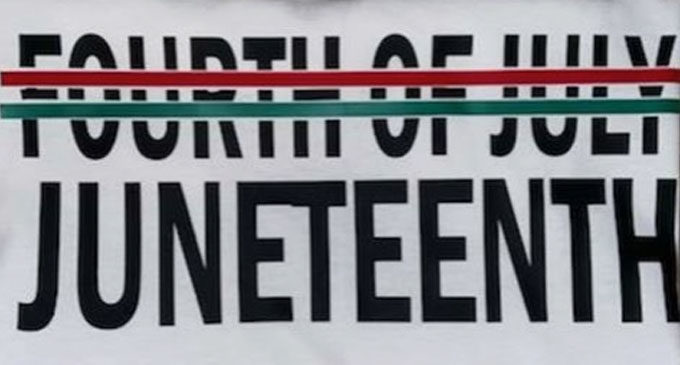July 4 is Independence Day. Really?

The fourth of July represents a special meaning for millions of Americans. It commemorates the Declaration of Independence of the United States from Britain in 1776. That meant we were free from British rule, but that did not apply to all Americans, namely people of color.
As a naïve child, I would look forward to July 4, because I knew I would be gathering with family and friends and enjoy a nice cookout, games and fireworks to cap off the night. As I became older and began to learn more about American history and specifically African American history, the holiday began to lose some meaning for me.
I could not understand how a country could declare itself free from another country, while the institution of slavery was so prevalent in the colonies themselves. It seemed a bit hypocritical. I then asked myself, was it right for me to celebrate a holiday that my ancestors did not get to enjoy until nearly a century later? And if we are being honest, it was much later than that due to Black Codes, Jim Crow and segregation, just to name a few barriers.
It wasn’t until high school that I learned what Juneteenth was. I vaguely remember hearing my parents speak about it when I was younger, but I never inquired what the term meant. My ninth-grade year, I had the pleasure of having one of the best teachers I ever had, Ms. Jean Robinson. For an assignment during Black History Month, she encouraged me to research what Juneteenth was and write an essay about it.
I already knew that the Emancipation Proclamation freed most slaves in January of 1863 and the rest were set free by the 13th Amendment to the Constitution in December of the same year. But what I failed to realize was that many slaves stayed enslaved for quite a long time after they were technically free under law. Once again, being a naïve child, I assumed that every state would follow the executive order and set their slaves free. Yeah, funny, I know.
Juneteenth is celebrated because it was the day Union Army General Gordon Granger announced federal orders in Galveston, Texas, on June 19,1865, proclaiming that all slaves in Texas were free. So that means for over two years, Black people in Texas were still under the impression that they were still slaves. I understand that news traveled slowly in those days, but I can’t fathom the fact that an entire state still held onto an institution that had been outlawed over two years earlier.
Celebrations of Juneteenth date back all the way to 1866 with church centered community events in Texas. It soon spread across the South and became more popular in the 1920s and 30s. Juneteenth picked up even more steam in the 1970s after the civil rights movement, when there was more of a focus on African American freedom and the arts.
After I wrote the essay in high school, it dawned on me that I really should be celebrating Juneteenth, instead of July 4. I am not saying that July 4 is not an important day in history, but if our founding fathers did what was right and never had slavery in the first place, there would be no need for a Juneteenth. For me, July 4 is like Columbus Day in that it really doesn’t hold that much meaning for me.
There has been a big push for Juneteenth to become a national holiday. Currently 47 states and the District of Columbia recognize Juneteenth as an official state holiday or observance. Ironically enough, Texas was the first state to recognize the day as a paid holiday in 1980.
If Juneteenth becomes a national holiday, it would not only spark conversations about the origins of our current racial and political landscape, but would also educate more people about white supremacy and how it has manifested itself in policies and political actions that still have ramifications to this day.
It kills me when I hear people say “just get over it” or “it was in the past” or “you were never a slave and I never owned any slaves,” but yet these are some of the same individuals still holding onto the memory of the failed Confederacy that committed the treasonous act of attempting to overthrow the government to fight for the right to continue to own slaves.
I have always believed that talking is the best way of overcoming differences between people, especially when there are inherent biases on both sides. Having Juneteenth become a national holiday would be another great way to spark conversations between Black people and others. It would also be a great way for Black people to educate themselves on our history in this country as well.
The deaths of George Floyd, Breonna Taylor and Ahmaud Arbery have brought to light the importance of remembering our history as a people. The struggles that Black people have had to endure for 400 years in this country should never be forgotten, because if we forget our history, we are doomed to repeat it.
Yes, Black people have come a long way since being “freed” by the Emancipation Proclamation, but we have had plenty of hurdles along the way. As I stated earlier, Black Codes, Jim Crow, segregation, voting barriers, lynchings and systemic racism have all held the Black community back, but we continue to plow forward.
It has only been a little over 50 years since the Civil Rights Movement and Black people have made tremendous progress in that span, while having obstacle after obstacle to overcome. But with white people having a 350-year head start, we still have a steep hill to climb to get on equal footing. But I think many white people will have to accept their role in history, not that they necessarily committed these horrible transgressions, but to acknowledge that those crimes committed against Black people for so long has had a dire effect on our current status in this country.
Moving forward, Juneteenth will continue to be my Independence Day and I pray that it does entice more people of different races to open up and talk, so we can really be one nation, under God, indivisible, with liberty and justice for all.









